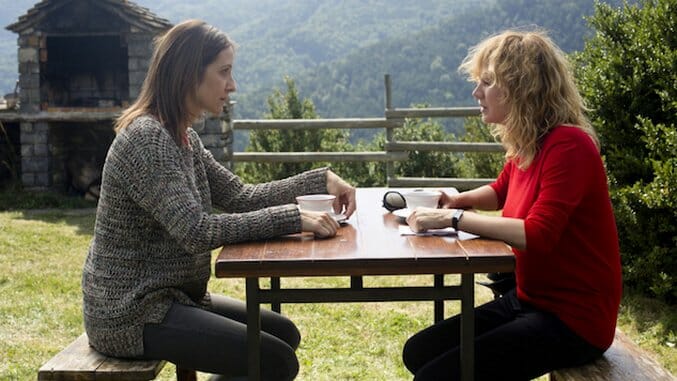
Rebounding from the disastrous I’m So Excited, writer-director Pedro Almodóvar is relatively subdued by his boisterous standards with Julieta, an absorbing melodrama that could almost be called All About Your Mother. The tale of a matriarch trying to explain to her long-lost daughter how she was conceived and why a chasm grew between them, Julieta weaves together sex, intrigue and regret with typical Almodóvar-ian flair. But there’s also a gentleness to the proceedings that’s especially tender. It’s a minor work from a major filmmaker that’s properly scaled in its modest heartbreak and insights.
As the story begins, middle-aged Julieta (Emma Suárez) is preparing to leave Madrid for Portugal so she can be with her new boyfriend Lorenzo (Darío Grandinetti), happy to start a new life. But while finishing up packing her place, she encounters Beatriz (Michelle Jenner), who was best friends with her daughter Antía when they were girls. Shocked to see Beatriz, Julieta is even more disoriented when the younger woman casually mentions that she ran into Antía, whom Julieta hasn’t seen for more than a decade. Impulsively, Julieta decides that she can’t move to Portugal: If there’s a chance to track down her daughter, she has to take it.
Julieta is the story of why mother and daughter stopped speaking, and it’s told through a long letter that Julieta writes to Antía in a journal. The older woman’s writing is shown through flashbacks as we meet a younger Julieta (now played by Adriana Ugarte) as she goes on a train trip, falling in love with a warm, handsome fellow passenger named Xoan (Daniel Grao). The man has a wife, although she’s been in a coma for several years, and after an accident forces the train to stop suddenly, Julieta and Xoan feel drawn to one another, their passion quickly turning to lovemaking.
Based on three interconnected short stories from Alice Munro’s 2004 collection Runaway, Julieta doesn’t have much new to say about intergenerational tensions and how tragedies can reroute lives. But as Julieta narrates her life, in which a happy marriage gives way to unrest, Almodóvar begins to examine the very exercise of telling one’s own story. Julieta fills in her absent daughter on the plot details she missed because she was too young or not yet born, but the older woman is also trying to attach meaning to an existence that, like so many, has hardly run smooth. Part apology, part justification, part rationalization, Julieta’s tale ultimately plays like an extended reintroduction to Antía, whom Julieta hopes may finally be willing to reconnect with her.
Suárez and Ugarte perform an impressive doubles routine, playing Julieta at different times in her life. It’s easy—too easy, actually—for us to think of our own mother solely in that constricting role of matriarch, negating the complexity of that person because of our limited perspective as her child. Almodóvar has explored the nuance of motherhood in other films, perhaps most famously in his 1999 Oscar-winner All About My Mother, but what’s touching about Julieta is how the writer-director finds his main character trying to reconcile the young lover she was with the mother she became. His two actresses give Julieta such an inner spark, but there’s also a melancholy in the performances, as if the older Julieta is looking back on her life with a sadness that might not have been there so much at the time. As a result, the present is rewriting the past.
But because this is an Almodóvar film, Julieta is also a florid, spirited affair. Though never as dark or kinky as The Skin I Live In or Bad Education, his latest has the same vivid, almost hyper-real look we associate with his earlier work, even though he’s collaborating for the first time with veteran French cinematographer Jean-Claude Larrieu. In Julieta, sex scenes have an offhand erotic charge, romantic affairs are a typical occurrence, and overheated plot twists (including a fatal sea journey) are central to the narrative. At 67, Almodóvar isn’t as outrageous and transgressive as he once was—which, after the forced campiness of I’m So Excited, is probably just as well—but the filmmaker’s love of pulp storytelling remains alive and well.
For reasons best not to reveal, Antía (Blanca Parés) departs her mother’s life when she’s a teenager, and Julieta builds to the mysterious circumstances regarding the daughter’s decision. We sense that, as Julieta writes her long note, she’s hoping she’ll finally fully understand why her only child walked out on her. The movie’s ending feels abrupt, but Almodóvar is perhaps suggesting that any anticipated reunion between Julieta and Antía isn’t really how this narrative needs to resolve. Before this mother can locate her daughter, maybe she needs to find herself first.
Director: Pedro Almodóvar
Writers: Pedro Almodóvar (screenplay); Alice Munro (short stories)
Starring: Emma Suárez, Adriana Ugarte, Daniel Grao, Inma Cuesta, Darío Grandinetti, Michelle Jenner, Rossy de Palma
Release Date: Dec. 21, 2016
Tim Grierson is chief film critic for Paste and the vice president of the Los Angeles Film Critics Association. You can follow him on Twitter.